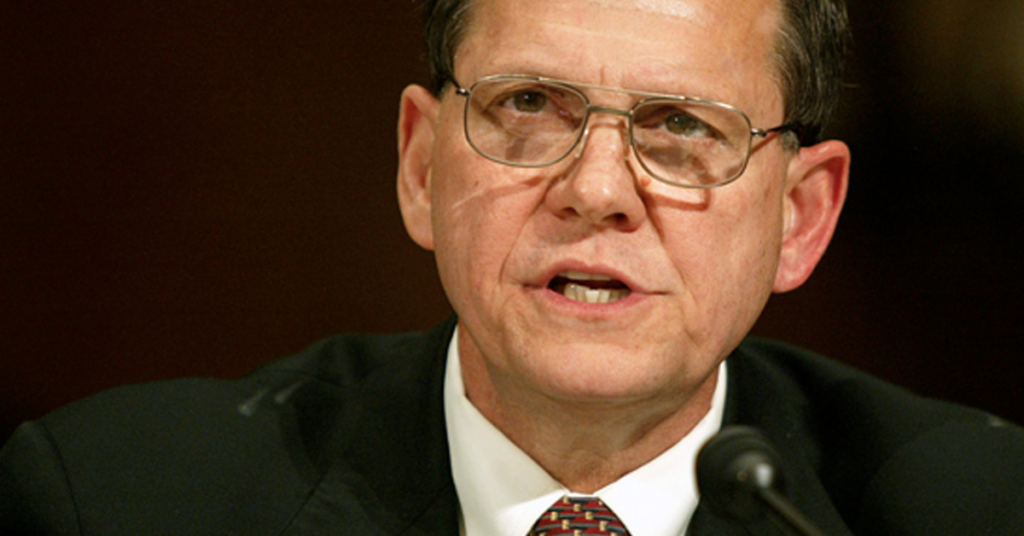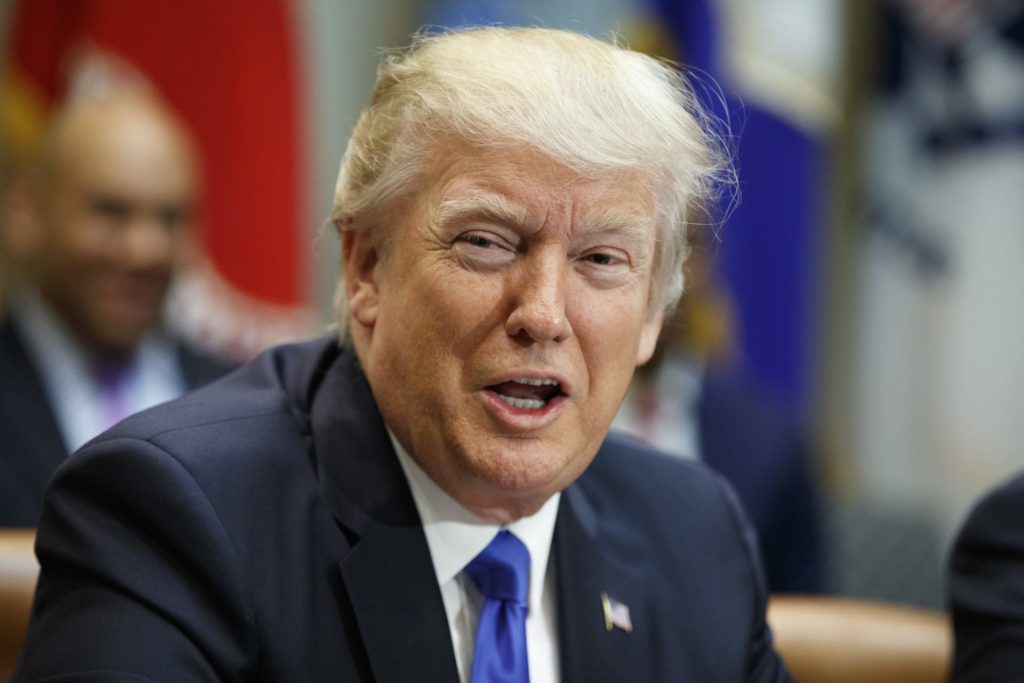Roy Moore threatens lawsuit over Washington Post allegations

Former Alabama Chief Justice and U.S. Senate-hopeful Roy Moore said a lawsuit will be filed over a bombshell The Washington Post report that detailed the accounts of four women who claim he sexually pursued them when he was in his 30s and they were in their teens. With the Dec. 12 special election only four weeks away, Moore assured supporters during a campaign event Sunday night at the Huntsville Christian Academy in Huntsville, Ala. that the report was “fake news” and “a desperate attempt to stop my political campaign.” “The Washington Post published another attack on my character and reputation because they are desperate to stop my political campaign. These attacks said I was with a minor child and are false and untrue — and for which they will be sued,” Moore said at the event. Moore’s remarks come amid increasing pressure from the Republican Party to drop out of the race. “Why would they come now? Because there are groups that don’t want me in the United States Senate,” he said, calling out the Democratic Party and the Republican establishment. “We do not plan to let anybody deter us from this race.” It is unknown whether or not Moore will actually follow through with a lawsuit. He provided no details about what type of suit he planned to file or when he planned to file it. The event was closed to reporters, but the Moore campaign broadcast the event live on Facebook. Watch Moore’s Huntsville speech below:
Martin Dyckman: How can we respect the presidency, when Donald Trump clearly doesn’t?

When President Harry S. Truman threatened in December 1950 to punch out a Washington Post music critic who had panned his daughter’s singing, he wrote the letter in his own hand, affixed his own postage stamp, and did not make it public. Neither did the Post. But America knew all about it once it had leaked to the Washington News. “It seems to me that you are a frustrated old man who wishes he could have been successful,” the president wrote …”Some day I hope to meet you. When that happens, you’ll need a new nose, a lot of beefsteak for black eyes, and perhaps a supporter below!” Public reaction was divided. Some people, Republicans especially, said that what Truman did was terrible. Others, fathers especially, applauded him for sticking up for his daughter. Actually, the critic, Paul Hume, was a young man, 34, only three years into what became a long and acclaimed career at the Post. When they finally did meet, years later at Truman’s home in Independence, Missouri, they played the piano together. Truman’s outburst comes to mind with the news of the very public way in which Donald Trump and his shrill White House shill, Kellyanne Conway, reacted to news of a department store chain, Nordstrom, dropping Ivanka Trump‘s branded merchandise. The so-called president used his personal and White House Twitter accounts to denounce the company for treating his daughter “unfairly.” Conway was on Fox “News” the next day urging people to “go buy Ivanka’s stuff. “I’m going to give a free commercial here. Go buy it today everybody, you can find it online,” Conway said. That goes way, way beyond what Truman did, and is far, far worse. Truman involved public resources only to the extent that he was living in the White House when he wrote the letter, and he did not pitch his hissy fit in public. Trump and Conway are using their bully pulpit—a term that they obviously misunderstand—to promote his daughter’s private business. And although Trump as president is exempt from ethics rules that prohibit that, Conway clearly is not. Those rules—with which Conway, as a lawyer, ought to be familiar–forbid any executive branch employee from using the office “for his own private gain, for the endorsement of any product, service or enterprise, or for the private gain of friends, relations, or persons with whom the employee is affiliated in a nongovernmental capacity.” At least one formal complaint has already been lodged with the Office of Government Ethics. And here’s what the chief ethics counsel to President George W. Bush, Richard W. Painter, said about it, quoted in The New York Times: “The events of the past week demonstrate that there is no intent on the part of the president, his family, or the White House staff to make meaningful distinctions between his official capacity as president and the Trump family business.” Trump’s staff, he noted, “instead of trying to push him back on this, they’re jumping in this and shilling for the businesses alongside him.” Can we count on Jeff Sessions, the new attorney general, to law down the law to Trump? Perhaps when pigs are piloting 747s. There are doubtlessly a lot of people who aren’t bothered by any of this. They’re those who either voted for the new regime, knowing and liking what it would be, or weren’t concerned enough to go and vote. They seem to include the Republicans running the Senate, which has yet to deny Trump anything. But for the rest of us, which I think is a majority, this is the question: How can we be expected to respect the office of president when its occupant doesn’t respect it himself? The regime’s abuse of public office for private gain is far from the worst of it. Trump’s relentless attacks on the media and, now, the judiciary are the worst of it. None of his predecessors, not even Richard Nixon, were so persistently thin-skinned, petulant, and heedless of the stature the presidency needs and deserves. Trump’s bombastic, childish, vainglorious outbursts are diminishing not only him, but the office. If it were just about him being a crybaby, that would be bad enough. But what he is doing—with calculation and malice, and no doubt with Steven Bannon‘s encouragement—is to poison the public’s mind against the only two nonpartisan institutions, the courts and the media, that are willing and able to stand in the way of his abuses of power and his incipient dictatorship. As it happens, the war on the media is a monumental act of ingratitude. Trump wouldn’t be in the White House had television not fawned on his every act and outrage as a candidate, had the newspapers not contrived to put his picture on every Page 1, had the media been willing earlier to call him out on his falsehoods, and had it not given him, in effect, a free ride against Hillary Clinton by portraying her, falsely, as his equal in sleaze. Trump understood, as they did not, that it did not matter what they said about him so long as they said it. Now it matters. It matters a lot. The case for impeachment already exists, and it is building hour by hour, day by day. ••• Martin Dyckman is a retired associate editor of the Tampa Bay Times. He lives in Asheville, North Carolina.
Martin Dyckman: Donald Trump’s remarks about nuclear weapons are scary

Is it time to recycle the daisy ad? The most effective political spot ever filmed begins with a precious little girl pulling petals from a flower, counting them imperfectly. It segues to a man’s harsh voice counting down from 10. The child’s face dissolves into the hideous sight and sound of an H-bomb test. “These are the stakes,” says another voice — the familiar one of the president of the United States. “To make a world in which all of God’s children can live or to go into the darkness. We must either love each other or we must die.” “Vote for President Johnson on Nov. 3,” says an announcer. “The stakes are too high for you to stay home.” The ad did not mention Barry Goldwater, Johnson’s arch-conservative, hawkish Republican opponent, and it was pulled after running only once. But nearly everyone saw it in news replays, and it contributed enormously to LBJ’s landslide victory in November 1964. The message was that Goldwater shouldn’t be trusted with the nuclear codes. He had, in fact, suggested the use of low-yield nuclear weapons in Vietnam. Anyone old enough to have seen the ad will never forget it. For everyone else, it’s on YouTube. Search for “daisy ad.” There is now a candidate for president, presently leading the race for his party’s nomination, whose reckless talk about nuclear weapons makes Goldwater look rather like a peacenik. That candidate has suggested that South Korea and Japan should be encouraged to develop their own nuclear arsenals so as to shoulder a greater load of their own defense, which is now guaranteed by the United States. “At some point, we cannot be the policeman of the world,” Donald Trump said. “And unfortunately, we have a nuclear world now … Now, wouldn’t you rather, in a certain sense, have Japan have nuclear weapons when North Korea has nuclear weapons?” No, we wouldn’t. And neither would Japan, which promptly cited its prudent policy of never possessing them. As for the two Koreas, what does Trump suppose that the North’s manic dictator Kim Jong Un would do with his nukes should he see or suspect South Korea actually undertaking to develop one? Trump is practically goading the tyrant to use one now. The problem, of course, is that Trump shoots from the lip, whether the subject is war, women, abortion, or anything else. As The Washington Post columnist Katherine Parker put it, “The man either can’t or won’t think before speaking.” Newt Gingrich, a supporter, acknowledged that Trump doesn’t see that “being president of the United States is a team sport that requires a stable personality that allows other people to help him.” That too many nations already have nuclear weapons hardly makes a case that others should. It means just the opposite. Nuclear nonproliferation is a long-standing, bipartisan policy that we share with all our allies as well as such less-friendly nations as Russia and China. It’s why we assembled a coalition to enforce the sanctions that pressured Iran into forsaking its own pursuit of a nuclear arsenal. “We don’t want somebody in the Oval Office who doesn’t recognize how important that is,” President Barack Obama said Friday at the close of a summit meeting on nuclear security. “Even those countries that are used to a carnival atmosphere in their own politics want sobriety and clarity when it comes to U.S. elections because they understand that the president of the United States needs to know what’s going on around the world,” the president said. The next president, heaven forbid, could be someone who not only doesn’t know but doesn’t seem to care that he doesn’t know. The only one thing worse than ignorance in politics is the willful stupidity of a candidate who assumes that his gut instincts are all the knowledge he needs. Trump’s interview with The Washington Post’s editorial board was so jaw-dropping that the newspaper posted the full transcript online. Click here to read it. Typical of his dissembling and evasion was his answer to a timely question about whether “it’s a problem that the percentage of blacks in prison is higher than whites, and what do you think is the root of that situation?” Trump wouldn’t say. Asked a second time, he still wouldn’t say. Asked directly whether he believes there are “disparities in law enforcement,” this is what he finally did say: “I’ve read where there are and I’ve read where there aren’t. I mean, I’ve read both. And, you know, I have no opinion on that.” On climate change: “Perhaps there’s a minor effect, but I’m not a big believer in man-made climate change … to me, the biggest risk is nuclear weapons.” And then he went out and dialed that risk up yet another notch. Ten, nine, eight, seven … *** Martin Dyckman is a retired associate editor of the St. Petersburg Times. He lives in suburban Asheville, North Carolina.
Jac VerSteeg: Keep gun owners from killing themselves

In America guns now kill as many people as cars. The facts behind this trend offer an opportunity for cooperation between gun rights factions and gun safety factions. The headline – guns kill as many as cars – at first looks like a slam dunk condemnation of rising gun violence. That’s not the case. The underlying cause is not a spike in gun homicides. Rather, it is a steady reduction in the number of motor vehicle deaths. (By the way, in Florida vehicular fatalities still outnumber gun deaths.) There’s another wrinkle in the national stats. Of the 30,000 people who die from gun violence every year, about 20,000 are suicides. Therein lies the opportunity for agreement between pro-gun and anti-gun factions. Both should want to reduce suicide rates by providing resources for mental health. Gun rights advocates have conceded – at least, some have – that guns should be kept out of the hands of the mentally ill. When there is an attack such as the murders committed at the Planned Parenthood clinic in Colorado Springs, gun rights forces are eager to blame the shooter’s mental illness rather than the firearms used to kill, in this case, three people including a police officer. But for every high-profile case like that, there are thousands of gun deaths that barely are noticed except by the family and friends of the victims. I’m talking, of course, about those 20,000 suicides by gun every year. Suicide is an extreme symptom of mental illness. One reason suicide is so little noted is that it is clouded in stigma and shame. News media traditionally have not reported on lone suicides out of consideration for the surviving friends and family members. Suicide has been seen as a private matter. But not always. As the Sun Sentinel reported, 56-year-old Clive A. Muir shot himself to death on New Year’s Day. But not before he also shot two assistant managers, one fatally, who worked at the Boston Market in Tamarac where Muir had worked before being fired last fall. It is impossible to know whether mental health intervention could have prevented Muir’s attacks and suicide. The same is true of every specific suicide. But it is a reasonable assumption that intervention by mental health professionals can and does prevent some suicides. Further, the same intervention that helps individuals cope with the loss of their jobs or other life crises reasonably can be assumed to prevent, in some cases, the kind of murder-suicide tragedies that Muir inflicted on himself and his victims. I know from personal experience – having lost close family members to murder-suicide involving gun violence – that mental health intervention will not work in every case. Finding out what kind of intervention does work to prevent suicide should be a major subject of research. But it isn’t. Why? In part because Congress since 1996 has blocked funding for the Centers for Disease Control and Prevention that specifically would have paid for research into the effects of gun violence on Americans’ health – including the role that guns play in suicide. The Washington Post has reported that the CDC has balked at getting involved in such research even after President Barack Obama issued an executive order authorizing some gun-violence research after the 2012 Sandy Hook Elementary School massacre. The CDC – and other sources of research funding – simply are afraid of retaliation from Congress and gun rights groups if they pay for any studies that could be interpreted as favoring gun control. That fear is preventing robust research that could pinpoint the best way for clinical psychologists and other mental health professionals to, in layman’s terms, talk people out of committing suicide. The most obvious irony is that preventing research into suicide prevention results in lethal harm to gun owners themselves. When about 20,000 people kill themselves with guns every year, roughly 20,000 gun owners are proving that guns often are more dangerous to their owners than they are to any outside threats. Gun rights advocates, as well as gun control advocates, should be able to agree that improving access to mental health services is a goal that would prevent gun deaths. Further, they should be able to agree that research to improve the mental health services actually delivered would prevent gun deaths. Not agreeing is, well, suicide. • • • Jac Wilder VerSteeg is a columnist for The South Florida Sun Sentinel, former deputy editorial page editor for The Palm Beach Post and former editor of Context Florida. For more state and national commentary visit Context Florida.
Matthew Brown running for State Board of Education

State Board of Education appointee Matthew Brown announced on Tuesday he will run to seek the Republican nomination for a new term on the board. The 28-year-old Republican was a design engineer with the Baldwin County Highway Department before his appointment by Gov. Robert Bentley to the board in a controversial move that drew the ire of The Washington Post, who decried the appointment of a man the paper described as ‘no friend of public schools.’ Brown’s family home schools their children and is an ardent supporter of tax credits and vouchers to support parochial and charter schools. Brown will run for the District 1 seat on the board and says he is not for a weaker school system, but rather in favor of stronger families and greater parental involvement in their children’s education. “Every time I cast my vote regarding a particularly policy or program before the State Board of Education I will always ask this question: Does this policy or program enable and empower parents to be more engaged and involved in their child’s education?” said Brown in his kick-off announcement. Brown currently occupies the District 1 seat – home to some 735,000 Alabama residents – and promises to continue his aggressive approach to parental empowerment, saying accountability and transparency are paramount for someone seeking his office. “As your District 1 representative on the State Board of Education, I am committed to combing through our annual education budget and ensuring that our tax dollars are being leveraged to the greatest benefit to our students,” said Brown in prepared remarks. Brown helped lead the charge against the “Build Baldwin Now” campaign that sought to raise local property millage rates in order to fund new school construction. Brown is a graduate of Pensacola Christian College and Samford University’s College of Law. He serves as chair of the Baldwin Young Republicans.
Why the Washington Post is scared of Matthew Brown on the Board of Education

Earlier this week Valerie Strauss of the Washington Post took to task Governor Robert Bentley‘s appointment of Matthew Brown to the state’s Board of Education. Why is a national columnist worried so much about what happens in Alabama’s schools? Because Brown has realistic expectations of the education system. Strauss points to his opposition to a tax increase, opposition that voters overwhelmingly agreed with him on voting 2-1 against the increase. If you want to read more about the fiscal and logical reasons Brown and voters rejected the tax, visit the website he set up Education Baldwin Now. Strauss doesn’t like that Brown has the audacity to realize throwing money at the system isn’t going to fix it. Brown supports school choice including charter schools (which he emphasizes accountability for) and homeschooling (which he was himself). He openly admits that if a public school isn’t the best available place for his children to get an education he would consider alternatives to make sure they receive the kind of education that all parents should desire for their families. Why on earth would we want that fresh take and that perspective to be represented on a board tasked with education decisions? Wait, wait, I know it’s because he’s not deeply entrenched in the school system. Being jaded by years of being a cog in a machine that abhors change and progress should certainly be a prereq for the Board. Wishing local school boards and the state spendendless amounts of money should be a prereq for the job. Openly stating that you’d put your children in public schools even if they’re not the best choice available, providing the highest quality education and safety should be a prereq. Yes, Matthew Brown certainly can’t be qualified for the Board of Education because his perspective is too unique. He was homeschooled. Oh the travesty. Using that logic no one at the Pentagon who hasn’t been in a war zone should be making decisions on military action. His motivation, a better system that will make public schools the best option for his children is not really that important. His willingness to look at all of the information and all of the options that could make our schools better is just terrible.
Michael Bloomberg comes to Alabama … at least his soda tax idea does

Alabama Today is hearing chatter throughout the Statehouse about the introduction of a 10-cent soda tax during the impending Special Session for the budget as a way to raise revenue. Limiting and taxing soda as a way of combating obesity, which is linked to sky-high health care costs isn’t new. Former New York City Mayor Michael Bloomberg supported an effort in 2012 that led to a cap on soda size within the New York City limits. The cap was thrown out by the New York Court of Appeals in June 2014. That court ruling however didn’t stop Bloomberg’s efforts to attack soda. According to The Washington Post, Bloomberg went on to be the largest funder of an initiative to increase the tax for sodas in Berkley, Calif. The city with Bloomberg’s help was the first in the nation to pass a one-cent tax for every ounce sold as both a revenue-generating measure and an effort to decrease the sugar consumption associated with soda and such drinks. The federal government has also seen recommendations of increasing the tax to make sodas and sugary drinks less attractive. Are there any Bloomberg conservatives here in Alabama? We shall soon see. Check back for more on this developing story.


